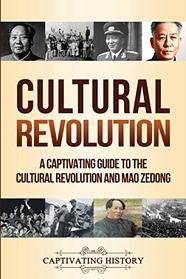This book is in two parts: (1) The Cultural Revolution, instituted by Chairman Mao, and (2) the story of Mao Zedong, the man who brought communism to China. Because the Chinese don't seem to value individual life, various numbers are given for the death counts exacted by Mao and the communists over the years of his rule (essentially from 1949 until 1976).
In the first section, the author stuns the reader with the information that the Cultural Revolution, instituted to keep China communist, was the reason that between 1/2 million and 2 million Chinese people died (in only 10 years, between 1966 and 1976).
Over the years, I've read about many countries trying to modernize and bring their country into the Industrial Revolution, or whatever. When the leaders try to do it in a short period of time, the results are often traumatic. Looking at the starving associated with the Great Leap Forward and the horrors for the poorest of the citizens during the Great Famine, it is obvious that Mao wasn't a leader with an understanding of what he was doing or compassion for his citizens. Mao was anti-intelligence and learning.
Learning about Mao's personal habits was a shock. Mao was undisciplined in taking care of his health and didn't consult with physicians about his venereal disease(s). The best fact in the book, however, was telling the average life expectancy in China (at the time) to be 44 years! This was while Mao was 70+ and trying to keep hold of his leadership role.
The second section really zeroes in on Mao's character and inspirations. After reading about the turbulent history of China with foreign countries, Mao decided to shape himself into the "hero that China needed, ready to undo the humiliations inflicted by foreign powers and the injustices wrought by its long line of corrupt monarchs, court officials, feudal lords, oligarchs, and military leaders." (p. 134)
Before you get too excited about Mao's expertise in turning his country around from an agrarian society to an industrial arms-making country, please note. Because of Mao's grandiose plan to become a military superpower, an estimated 45 million starved to death during the (years 1958 - 1961) in the Great Famine (compare that with the following fact: In all the major wars from 1900 to 1987, there were 34 million deaths). (p. 123)
The first book of this set was very interesting; I would rate it 5 stars. However, the second part of this book was too much uninteresting information (it expanded on the first book, in many ways). I barely made it through that part. I would rate it 3 stars. Thus, the overall rating would be 4 stars.
I hesitate to downgrade such a scholarly and well-explained story (22 pages of primary and secondary sources), but Mao was a fairly loathsome character who looked down on his citizens and did exactly what his dynasty-forefathers did (expansive, multiple homes, numerous lovers and courtesans, lavish meals, etc.).
In the first section, the author stuns the reader with the information that the Cultural Revolution, instituted to keep China communist, was the reason that between 1/2 million and 2 million Chinese people died (in only 10 years, between 1966 and 1976).
Over the years, I've read about many countries trying to modernize and bring their country into the Industrial Revolution, or whatever. When the leaders try to do it in a short period of time, the results are often traumatic. Looking at the starving associated with the Great Leap Forward and the horrors for the poorest of the citizens during the Great Famine, it is obvious that Mao wasn't a leader with an understanding of what he was doing or compassion for his citizens. Mao was anti-intelligence and learning.
Learning about Mao's personal habits was a shock. Mao was undisciplined in taking care of his health and didn't consult with physicians about his venereal disease(s). The best fact in the book, however, was telling the average life expectancy in China (at the time) to be 44 years! This was while Mao was 70+ and trying to keep hold of his leadership role.
The second section really zeroes in on Mao's character and inspirations. After reading about the turbulent history of China with foreign countries, Mao decided to shape himself into the "hero that China needed, ready to undo the humiliations inflicted by foreign powers and the injustices wrought by its long line of corrupt monarchs, court officials, feudal lords, oligarchs, and military leaders." (p. 134)
Before you get too excited about Mao's expertise in turning his country around from an agrarian society to an industrial arms-making country, please note. Because of Mao's grandiose plan to become a military superpower, an estimated 45 million starved to death during the (years 1958 - 1961) in the Great Famine (compare that with the following fact: In all the major wars from 1900 to 1987, there were 34 million deaths). (p. 123)
The first book of this set was very interesting; I would rate it 5 stars. However, the second part of this book was too much uninteresting information (it expanded on the first book, in many ways). I barely made it through that part. I would rate it 3 stars. Thus, the overall rating would be 4 stars.
I hesitate to downgrade such a scholarly and well-explained story (22 pages of primary and secondary sources), but Mao was a fairly loathsome character who looked down on his citizens and did exactly what his dynasty-forefathers did (expansive, multiple homes, numerous lovers and courtesans, lavish meals, etc.).




